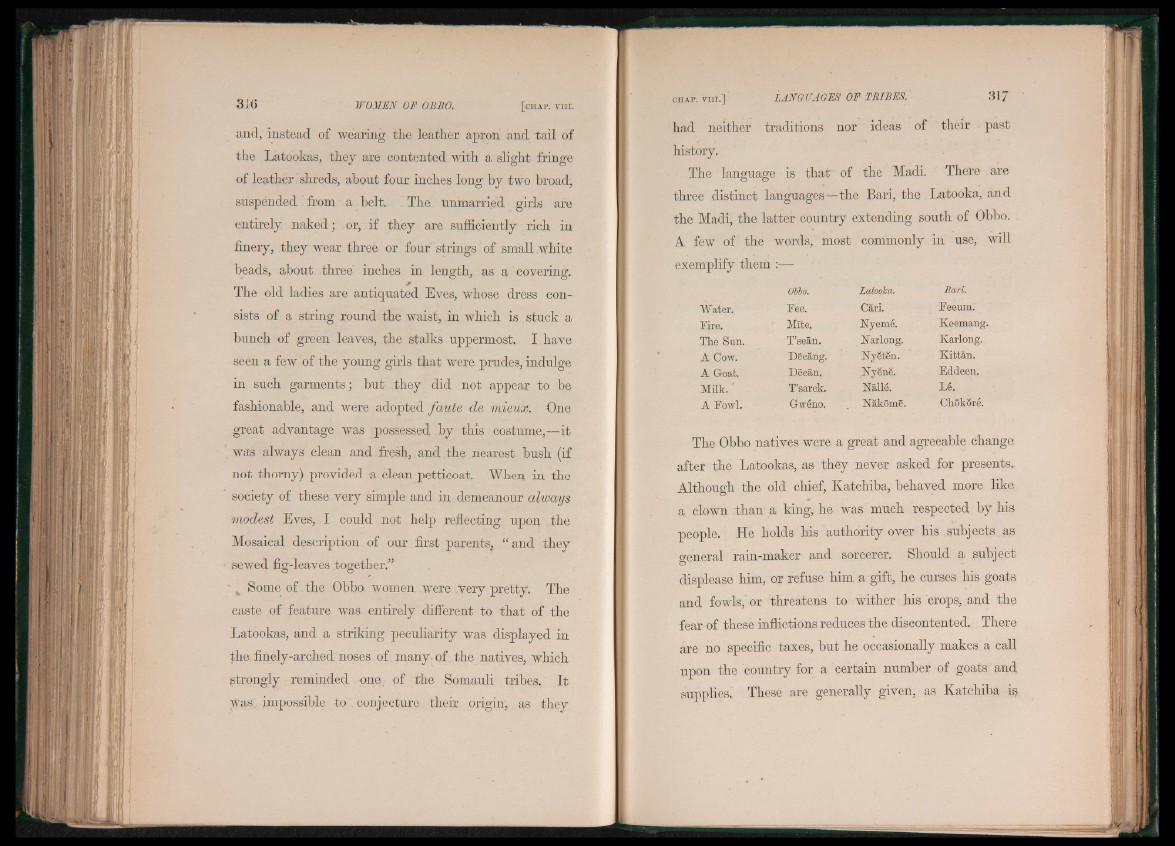
and, instead of wearing the leather apron and tail of
the Latookas, they are contented with à slight fringe
of leather shreds, about four inches long by two broad,
suspended from a belt. The unmarried girls are
entirely naked ; or, if they are sufficiently rich in
finery,,they wear three or four strings of small white
beads, about three inches in length, as a covering.
The old ladies are antiquated Eves, whose dress consists
of a string round the waist, in which is stuck a
bunch of green leaves, the stalks uppermost. I have
seen a few of the young girls that were prudes, indulge
in such garments; but they did not appear to be
fashionable, and were adopted faute de mieux, One
great advantage was possessed by this costume,—it
‘ was always clean and. fresh,, and. the nearest bush (if
not thorny) provided a clean petticoat. When in the
society of these very simple and in demeanour always
modest Eves, I could not help reflecting upon the
Mosaical description of our first parents, "an d .th ey
sewed fiog -leaves togoether."
Some of the Obbo women were very pretty. The
caste of feature was entirely different to that of the
Latookas, and a striking peculiarity was displayed in
the. finely-arched noses of. many, of the natives, which
Strongly reminded one. of the Somauli tribes, ' It
wasyimpossible to . conjecture their origin, as they
had neither traditions nor ideas of their past
history.
The lango uagoe is that of the Madi. There are
three distinct languages—the Bari, the Latooka, and
the Madi, the latter country extending south of Obbo.
A few of the words,’ most commonly in use, will
exemplify them
Obbo. Latooka. Bari.
Water. Fee. Câri. Feeum.
Fire. Mite, Nyemé. Keemang.
Tlie Sun. T’seân. FTarlong. Karlong.
A Cow. Dëeâng. Nÿëtën. Kittàn.
A Goat.' Dëeân, Nyënë. Eddeen,
Milk.' T’sarck. îtâllé. Lé.
A Fowl. Gwéno. Nakômë. Chôkëré.
The Obbo natives were a great and agreeable change
after the Latookas, as they never asked for presents.
Although the old chief, Katchiba, behaved more like
a clown than a king, he was much respected by his
people. He holds his authority over his subjects as
general rain-maker and sorcerer. Should a subject
displease him, or refuse him a gift, he curses his goats
and fowls,' or threatens to wither his crops, and the
fear of these inflictions reduces the discontented. There
are no specific taxes, but he occasionally makes a call
upon the country for a certain number of goats and
supplies.” These are generally given, as Katchiba is